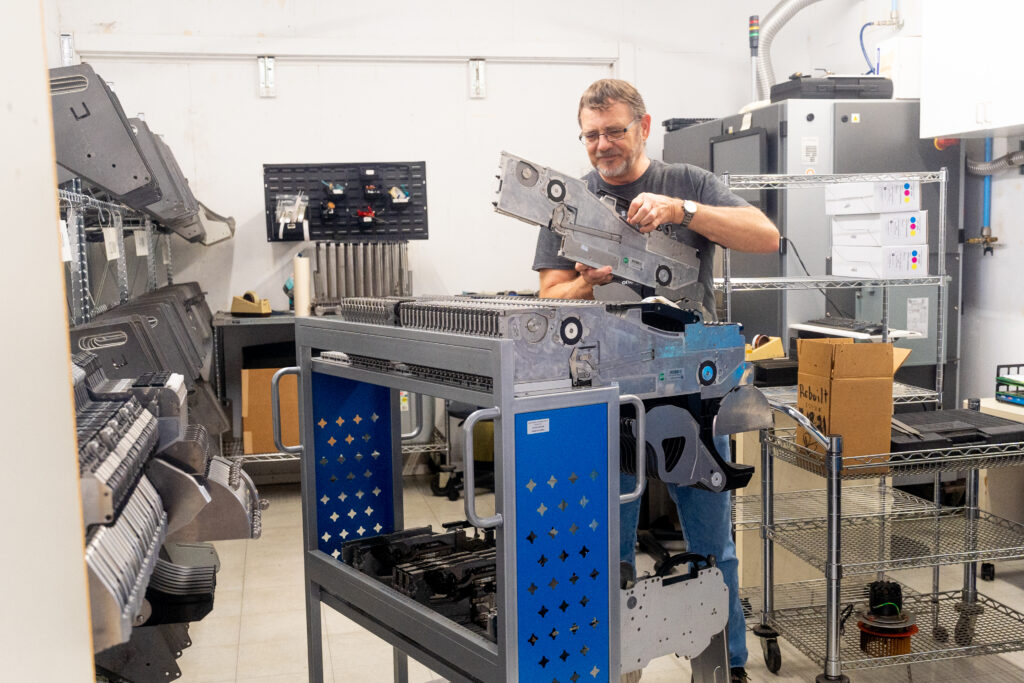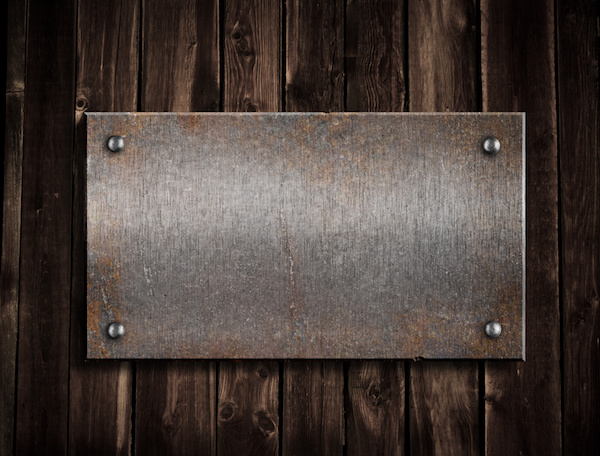Nameplate design plays a vital role in product identification, branding, and labeling, making them an essential component in various industries.
To create visually appealing and durable nameplates, choosing the right graphic design method is crucial.
In this blog, we will explore:
- Why nameplate design matters
- Key aspects of nameplate design
- Steps for crafting an aesthetic nameplate
- Where to find the best nameplates
Why Nameplate Design Matters
So why should your business invest time and money in carefully designing your nameplate? There are many advantages to having a clear and distinctive design:
- Branding Identity: A well-designed nameplate can showcase the company logo, colors, and typography, helping to reinforce brand recognition and create a professional image.
- Product Identification: Clear and visually appealing nameplate designs enable customers and users to quickly and easily identify products, which is crucial for sales.
- Communication and Information: An effective nameplate design ensures that this information is presented clearly and legibly, preventing confusion or potential misuse.
- Durability: A thoughtful design ensures that the nameplate can withstand harsh conditions without fading, peeling, or becoming illegible over time.
- Compliance and Regulation: A well-designed nameplate ensures that all required information is included, meeting legal requirements and avoiding potential fines or penalties.
- Aesthetics: A visually appealing and well-executed design conveys professionalism, quality, and attention to detail, instilling confidence in customers and users.
- Competitive Advantage: A distinctive nameplate may catch the attention of potential customers and encourage them to choose a particular product over others.
- Consistency: Consistent nameplate design across product lines creates a cohesive and unified brand image. This consistency reinforces brand recognition and establishes a sense of reliability and trust in the market.
- User Experience: An intuitive and user-friendly nameplate design enhances the overall user experience and reduces the chances of errors or accidents.
So how can you ensure your design is intuitive and visually appealing?
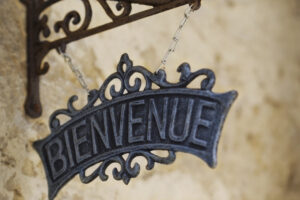
Critical Aspects Of Nameplate Design
When designing an aesthetically pleasing nameplate, there are a few things to consider.
Brand Identity
First and foremost, your nameplate needs to easily be identified with your brand. It should clearly reflect your product’s value. Think about color, shape, embossing, and size. For example, if your product is a heavy-duty piece of equipment, you want the nameplate to reflect durability.
Legibility
No matter the size or the product, make sure people can read your nameplate. You might think that is common sense, but it can be more difficult than it seems.
Uniqueness
Will customers notice your nameplate? When they see it, you want them to think of the value your product brings. Be careful not to be too much like a competitor, causing confusion.
Adaptable
You often need a nameplate that works on a variety of products. This may be the same nameplate used on multiple products or a scalable design that translates to a family of nameplates reinforcing your brand.

Steps for Crafting an Aesthetically Pleasing Nameplate Design
Choose The Right Material
When creating nameplates, choosing the right material is crucial for ensuring durability, longevity, and suitability for specific applications. By understanding the unique properties of each material, you can make an informed decision and select the best one to meet your specific needs.
Plastic
There are several types of plastic to choose from depending on your project’s needs.
Polyester (Mylar)
Polyester nameplates are known for their high tensile strength, making them an excellent choice for identifying products and packaging that may undergo harsh treatment. They can endure exposure to powerful UV rays and chemicals without fading or degrading.
Polycarbonate (Lexan)
Polycarbonate nameplates are ideal for outdoor applications due to their ability to withstand the elements and high heat. They are more rigid and durable than polyester, making them suitable for applications requiring strong resistance to abrasion and heat.
Vinyl
Vinyl nameplates offer flexibility. Their wide range of thicknesses allows for customization according to specific requirements. Moreover, outdoor vinyl nameplates can be coated with a UV protective layer, ensuring they remain intact and fade-resistant even when exposed to harsh environmental conditions.
Aluminum
Aluminum is a popular choice for nameplates because of its malleability, which allows it to be easily molded into different shapes and sizes. It exhibits excellent durability, making it suitable for both indoor and outdoor environments.
Anodized Aluminum
For added durability and resistance, anodized aluminum nameplates feature a protective layer that enhances their resistance to abrasion and corrosion. As a result, anodized aluminum nameplates are the most rugged of aluminum-based options, capable of withstanding harsh environmental conditions.
Stainless steel
Stainless steel nameplates are renowned for their density and durability, making them a preferred choice in various industries, especially in the food industry. Their exceptional resistance to scratches and antimicrobial qualities make them suitable for applications where hygiene is of utmost importance.
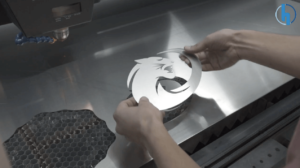
Brass
Brass nameplates are distinguished by their golden color and are often chosen for decorative purposes. Their strong resistance to saltwater and corrosion makes them an excellent choice for marine applications.
Brass nameplates add an elegant touch to products while maintaining their functionality in demanding environments.
Metalphoto
Metalphoto® aluminum is the epitome of durability and longevity, making it a popular choice for challenging applications. With a lifespan of over 20 years, even in harsh outdoor conditions, Metalphoto® is the material of choice for industrial and military engineers.
Its ability to meet stringent government, industrial, and military specifications further solidifies its reputation as a reliable option for nameplates.
Graphic Design
To create visually appealing and durable nameplates, choosing the right graphic design method is crucial. Each offers unique benefits and caters to specific requirements.

Screen Printed Nameplates
Screen printing is a popular and cost-effective method for creating nameplates. It is an ideal choice for light-duty applications and high-volume orders. This technique involves pushing ink through a mesh screen to transfer the design onto the substrate.
Screen-printed nameplates are known for their sharp and vibrant graphics, making them visually striking. However, they may not be as durable as other printing methods, making them more suitable for indoor or controlled environments.
Digitally Printed Nameplate
For mid-volume orders that require high-end graphics and a standard level of durability, digitally printed nameplates are an excellent choice. This printing method offers greater versatility in terms of design complexity, allowing for intricate details and full-color graphics. It allows for unique data such as QR Codes, Barcodes, and Portable Data Files.
Photo Imaging
When it comes to the most demanding applications, photo imaging is the ultimate graphic design option for nameplates. This method is utilized in creating Metalphoto® nameplates, which are known for their unparalleled durability and resistance to harsh conditions.
During photo-imaging, graphics are sealed beneath a sapphire-hard anodic layer, making the nameplate highly resistant to abrasion, heat, and sunlight. The result is a nameplate that can withstand extreme environments and maintain its pristine appearance for an extended period.
Etching
It is a chemical process that produces nameplates with excellent resistance to outdoor environments, ensuring they will not fade over time. This method involves chemically removing the material from the substrate to reveal the desired graphic.
Etched nameplates offer a sleek and professional appearance, making them suitable for various applications, including outdoor signage, industrial equipment, and identification tags.
Finishes
Last but not least, the finishes.
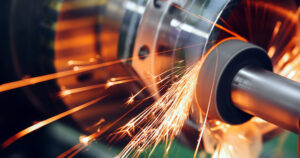
Embossed
This technique involves pressing an object into the metal nameplate to form raised characters or shapes. You can add logos or instructions onto your nameplate or even add brail.
Gloss
As the name suggests, a gloss finish provides a shiny and polished appearance, giving your tags a smooth and sleek look. Beyond its attractive shine, this finish is further enhanced with a durable coating, ensuring your tags have increased resilience and longevity.
Metallic
In contrast to the glossy option, a matte finish offers a non-reflective, subdued, and understated appearance to your tags. The matte finish also comes equipped with a protective hard coating, safeguarding the tags from potential scratches and ensuring they maintain their pristine condition over time.
Get An Aesthetically Pleasing Nameplate Design From Hallmark Nameplate
So where can you find aesthetically pleasing nameplates designed specifically for your needs? Hallmark Nameplate!
We offer a wide range of materials and printing options to make sure you get the perfect nameplate for your business. Plus our experienced designers will take you through every step to help you customize your design and exceed your expectations. Get your effective and thoughtfully designed durable nameplates today. Request a quote.

